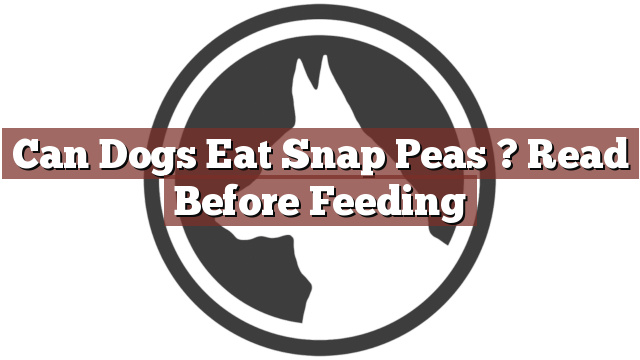Understanding Your Dog’s Dietary Needs
As a responsible dog owner, it is crucial to be aware of your furry friend’s dietary needs. While dogs primarily thrive on a diet that consists of meat, it is important to understand that they can also benefit from certain fruits and vegetables. However, not all human food is safe for dogs to consume. Therefore, it is essential to do proper research and consult with a veterinarian before introducing any new food into your dog’s diet.
Can Dogs Eat Snap Peas? Read Before Feeding
Now, let’s answer the question that might be on your mind – can dogs eat snap peas? The answer is yes, dogs can safely consume snap peas in moderation. Snap peas, also known as sugar snap peas, are low in calories, fat-free, and packed with essential nutrients. These crunchy, green vegetables are a great source of vitamins A, C, and K, as well as fiber and folate. However, it is important to prepare snap peas properly before feeding them to your dog.
Before serving snap peas to your furry companion, make sure to wash them thoroughly to remove any potential pesticides or harmful bacteria. It is recommended to cook or steam snap peas slightly to enhance their digestibility. Additionally, ensure that the snap peas are cut into small, bite-sized pieces to prevent choking hazards.
Pros and Cons of Feeding Snap Peas to Dogs
Feeding snap peas to your dog can have several benefits. Their high fiber content can promote a healthy digestive system and regulate bowel movements, which can be particularly helpful for dogs with gastrointestinal issues. The vitamins and minerals present in snap peas can contribute to a stronger immune system and overall well-being.
However, it is important to keep in mind a few potential drawbacks as well. Snap peas, like other vegetables, can cause gas in some dogs. If you notice excessive flatulence or gastrointestinal discomfort in your dog after consuming snap peas, it might be best to limit their intake. Additionally, while snap peas are generally safe for dogs, individual allergies can occur. Watch out for any signs of an allergic reaction, such as itching, swelling, or difficulty breathing, and consult with a veterinarian if such symptoms arise.
Conclusion: Considerations for Feeding Snap Peas to Your Dog
In conclusion, snap peas can be a healthy addition to your dog’s diet when fed in moderation. However, it is important to consider your dog’s specific dietary needs, preferences, and any pre-existing health conditions. Always introduce new foods gradually and monitor your dog for any adverse reactions. Remember, a balanced diet that primarily includes high-quality dog food is essential for your furry friend’s well-being. When in doubt, consult with your veterinarian to ensure you are making the best choices for your beloved pet.
Thank you for taking the time to read through our exploration of [page_title]. As every dog lover knows, our furry friends have unique dietary needs and responses, often varying from one canine to another. This is why it's paramount to approach any changes in their diet with caution and knowledge.
Before introducing any new treats or making alterations to your dog's diet based on our insights, it's crucial to consult with a veterinarian about [page_title]. Their expertise ensures that the choices you make are well-suited to your particular pet's health and well-being.
Even seemingly harmless foods can sometimes lead to allergic reactions or digestive issues, which is why monitoring your dog after introducing any new food item is essential.
The content provided here on [page_title] is crafted with care, thorough research, and a genuine love for dogs. Nevertheless, it serves as a general guideline and should not be considered a substitute for professional veterinary advice.
Always prioritize the expert insights of your veterinarian, and remember that the health and happiness of your furry companion come first.
May your journey with your pet continue to be filled with joy, love, and safe culinary adventures. Happy reading, and even happier snacking for your canine friend!

